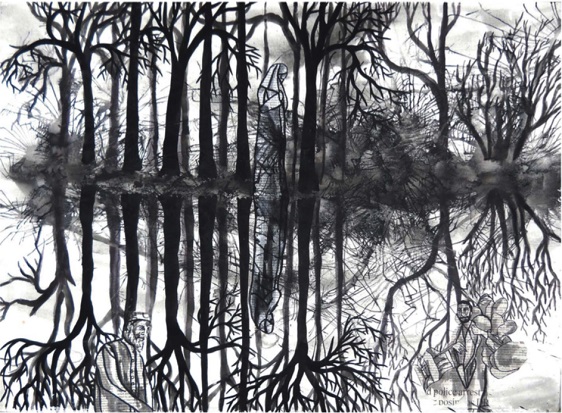Jis khak ke sammeer mein hai
Aatish-e-chinar
Mumkin naheen ki sard ho
Voh khak-e- arjumand
(In the conscience of which particle of dust there is the fire of Chinar, that heavenly dust can never feel cold)
-Muhammad Iqbal
I was born in this dust
With fire that can never cool
A holy man’s hands planted me here
Six hundred years ago
I blossomed even in droughts
Provided shade to people in summer
And warmth in winter
Herb for hurts,
A place for children’s play,
A rendezvous for lovers.
My core has memories
Just as my hollows shelter birds
I learnt my many postures from Patanjali
Panini taught my branches
Wind’s grammar.
The semiotics of my stem
Comes from Abhinavagupta.
The murmur of my leaves
Echo Sharangadev’s hindol.
My roots are hairs standing on end
Listening to the verses of
Lal Ded, Habba Khatoon and Arnimal
My whirlwinds turned
The freedom-songs of Rahman Rahi
Into flames kissing the sky
Shaivites and Sufis alike
Meditated under my green umbrella.
I talk ceaselessly to
The dead and the living
Talking, I change colour:
Yellow, mauve, red.
There are only Kashmiris here,
Those who hug one another
During Id and Baishakhi
Breaking every stone-wall and thorny hedge
Those who grow lotuses
In their hearts for the birthdays
Of Patmasambhav and Guru Nanak
And paint the lake with shikaras
Those who eat from the same plate,
Drink the same water and
Speak the same language of kindness.
Their religion was liberty
And their flag, love.
They studied their alphabets like this:
Anantnag Arnia
Badgam Baramulla Bishna
Chenani Devsar Gunderbar Hiranagar
Kishtwar Kulgam Kupwara
Kathvua Kargil
Lakhanpur Leh Manda
Pahalgam Pulwama Poonch
Shopian Sopore Srinagar
Talpara Uri Udhampur
Yarippora Vijaypur…
But now only blood spots remain
The blood of a land being
Mutilated and partitioned
The red blood of fleeing youth
Entangled in thorns
The brown blood of the nail-marks
Of the disgraced bodies of women
The purple blood flowing
From tender hearts torn by bullets:
That is what reddens my leaves now.
The spreading endless variations of red
From the eyes of children, once bluish,
Now pierced by pellets:
Blood,
In every season.
(Note: Chinar is a symbol of Kashmir, a tree whose leaves grow yellow, mauve and red in autumn. A tree with medicinal value, chinar adorns Persian gardens too. Islam saints like Mir Sayyid Ali had planted chinars centuries ago that are still alive in Kashmir. For Hindus, it is a tree sacred to goddess Bhavani. Chinars often have huge hollows in which children play and lovers secretly meet. It is also called the ‘speaking tree’ as wind on its leaves seems to be talking. Chinars have also been planted on the graveyards of hundreds of unknown Kashmiri martyrs slain by soldiers. The proper nouns in the poem refer to place names and names of the great poets, singers, saints and scholars from Kashmir).
ഒരു ചിനാര്മരത്തിന്റെ ആത്മകഥ
ജിസ് ഖാക്ക് കേ സമ്മീര് മേം ഹൈ/ ആതിഷ്-ഇ-ചിനാര്
മുംകിന് നഹീ കി സര്ദ്ദ് ഹോ/ വോ ഖാക്ക് –ഇ- അര്ജുമണ്ട്
(ഏതു പൊടിയുടെ മന:സാക്ഷിയില്/ ചിനാറിന്റെ അഗ്നിയുണ്ടോ
ആ സ്വര്ഗീയ ധൂളിക്ക്/ തണുക്കുക സാധ്യമല്ല)
– മൊഹമ്മദ് ഇക്ബാല്
ഈ മണ്ണിലാണ് ഞാന് ജനിച്ചത്,
ഒരിക്കലും തണുക്കാത്ത തീയുമായി,
അറുനൂറിലേറെ വര്ഷം മുന്പ്
ഒരു പുണ്യവാന്റെ കൈകള് എന്നെ ഇവിടെ നട്ടു.
വരള്ച്ചകളിലും ഞാന് തളിരണിഞ്ഞു
വേനലില് തണലായി
മഞ്ഞുകാലത്ത് ചൂടായി
മുറിവിന്നു മരുന്നായി
കുഞ്ഞുങ്ങള്ക്ക് കളിയിടമായി
കാമുകര്ക്ക് ഒളിയിടമായി
എന്റെ പൊത്തില് കിളികളെന്ന പോലെ
എന്റെ കാതലിലുണ്ട് ഓര്മ്മകള്,
ഞാന് പല നിലകള് പഠിച്ചത്
പതഞ്ജലിയില് നിന്ന്
എന്റെ ചില്ലകളെ കാറ്റിന്റെ
വ്യാകരണം പഠിപ്പിച്ചത് പാണിനി.
എന്റെ തടിയുടെ പൊരുള്
അഭിനവഗുപ്തന്റെത്
എന്റെ ദലമര്മ്മരങ്ങളില്
ശാരംഗദേവിന്റെ ഹിന്ദോളം
എന്റെ വേരുകള് ലാല് ദെദ്ദിന്റെയും
ഹബ്ബാ ഖാത്തൂണിന്റെയും അര്ണിമാലിന്റെയും
കവിതകള് കേട്ട കോരിത്തരിപ്പുകള്
എന്റെ ചുഴലിക്കാറ്റുകള്
റഹ്മാന് രാഹിയുടെ സ്വാതന്ത്ര്യഗീതങ്ങളെ
മാനം മുട്ടുന്ന ജ്വാലകളാക്കി
ശൈവരും സൂഫികളും എന്റെ
കുടക്കീഴിലിരുന്നു ധ്യാനിച്ചു
ഞാന് മരിച്ചവരോടും
ജീവിച്ചിരിക്കുന്നവരോടും
നിരന്തരം സംസാരിക്കുന്നു
സംസാരിച്ചു സംസാരിച്ചു നിറം മാറുന്നു:
മഞ്ഞ, ചുവപ്പ്, ഊതനിറം.
ഇവിടെ കാശ്മീരികളേയുള്ളൂ
എല്ലാ മുള്വേലികളും പൊളിച്ചു
ഈദിനും ബൈശാഖിക്കും
അന്യോന്യം കെട്ടിപ്പുണരുന്നവര്
പത്മസംഭവന്റെയും ഗുരു നാനാക്കിന്റെയും
പിറന്നാളുകള്ക്ക് ഹൃദയത്തില്
താമര വിരിയിച്ച് ശിക്കാരകള് കൊണ്ട്
തടാകത്തെ ചായം പൂശുന്നവര്
ഒരേ പാത്രത്തില് നിന്നുണ്ട്
ഒരേ നീര് കുടിച്ച് ഒരേ കരുണയുടെ
ഭാഷ സംസാരിച്ചവര്
അവരുടെ മതം സ്വാതന്ത്ര്യമായിരുന്നു,
അവരുടെ കൊടി സ്നേഹം.
അവര് അക്ഷരമാല പഠിച്ചത് ഇങ്ങിനെ:
അനന്ത് നാഗ് അര്ണിയാ
ഉരി ഉധംപൂര് കഠവാ കാര്ഗില്,
കിഷ്ത്വാര് കുല്ഗാം,
കുപ്വാരാ ഗുന്ദേര്ബര് ചേനാനി
തല്പ്പാറ ദേവ്സര്
പഹല്ഗാവ് പുല്വാമാ പൂഞ്ച്
ബദ്ഗാം ബാരാമുള്ള ബിഷ്നാ മണ്ഡാ
യാരിപ്പോരാ ലഖന്പൂര് ലേ
വിജയ്പൂര് ശോപ്പിയാന്
സോപ്പോര് ശ്രീനഗര് ഹീരാനഗര്…
ഇന്നിപ്പോള് എല്ലാം ചോരപ്പാടുകള് മാത്രമായി
വെട്ടി മുറിക്കപ്പെടുന്ന ഒരു നാടിന്റെ രക്തം
ഓടിപ്പോകുനവരുടെ തരുണശരീരങ്ങള്
മുള്പ്പടര്പ്പുകളില് കുരുങ്ങിയ അരുണരക്തം
അവമാനിക്കപ്പെട്ട പെണ്ണുടലുകളിലെ
നഖപ്പാടുകളിലെ തവിട്ടുനിറമുള്ള രക്തം
വെടിയുണ്ടയേറ്റ ലോലഹൃദയങ്ങളില്
നിന്നൊഴുകുന്ന ഊതനിറമായ രക്തം ,
അതാണിപ്പോള് എന്റെ
ഇലകളെ ചുകപ്പിക്കുന്നത്:
പടര്ന്നു കയറുന്ന,
അനന്തഭേദങ്ങളുള്ള, ചുകപ്പ്,
മുള്ളാണികള് തറഞ്ഞു കയറിയ
കുഞ്ഞുങ്ങളുടെ, നീലയായിരുന്ന
കൊച്ചുകണ്ണുകളില് നിന്ന്
രക്തം
എല്ലാ ഋതുക്കളിലും.
(കുറിപ്പ്: ചിനാർ – കാശ്മീരിയില് ബൂന്വി-ഈര്പ്പമില്ലാത്ത മണ്ണിലും വളരുന്ന കാശ്മീരിന്റെ പ്രതീകമായ വൃക്ഷമാണ്. നമ്മുടെ പപ്പായയെപ്പോലുള്ള ഇലകള്, ശരത്കാലത്ത് മഞ്ഞയും ചുകപ്പുമാകുന്നു. ഔഷധമൂല്യമുള്ള ഈ വൃക്ഷം പേഴ്സ്യന് ഉദ്യാനങ്ങളുടെ അലങ്കാരമാണ്. ഹിന്ദുക്കള്ക്ക് ഇത് ഭവാനീദേവിയുടെ പുണ്യവൃക്ഷമാണ്, മീര് സയ്യിദ് ആലിയെപ്പോലുള്ള ഇസ്ലാം പുണ്യവാന്മാര് നട്ട അറുനൂറും എഴുനൂറുംകൊല്ലം പഴക്കമുള്ള ചിനാര് മരങ്ങള് ഇപ്പോഴും കാഷ്മീരിലുണ്ട്. മുതിര്ന്ന ചിനാറിന്റെ വലിയ പൊത്തുകളില് കുട്ടികള് കളിക്കുകയും ഇണകള് ഒത്തു കൂടുകയും ചെയ്യുന്നു.’ നമ്മുടെ ആലിലകള് പോലെ കാറ്റില് മര്മ്മരങ്ങള് ഉണ്ടാക്കുന്നതിനാല് “സംസാരിക്കുന്നമരം’ എന്നും ചിനാറിനെ പറയാറുണ്ട്. കൊല്ലപ്പെട്ട 230 ആളുകളുടെയെങ്കിലും ജഡങ്ങള് ഉണ്ടെന്നു കരുതപ്പെടുന്ന, അടയാളപ്പെടുത്താത്ത ശ്മാശാനങ്ങള്ക്ക് മീതെയും ചിനാര് മരങ്ങള് വളര്ത്തിയിട്ടുണ്ട്. കാശ്മീരിന്റെ കവികള്, യോഗികള്, സംഗീതജ്ഞര്, കാവ്യമീമാംസകര്, സ്ഥലപ്പേരുകള് ഇവ കവിതയില് സൂചിപ്പിക്കുന്നു).
(Translated from Malayalam by the poet)

